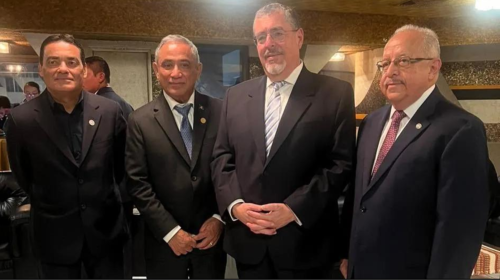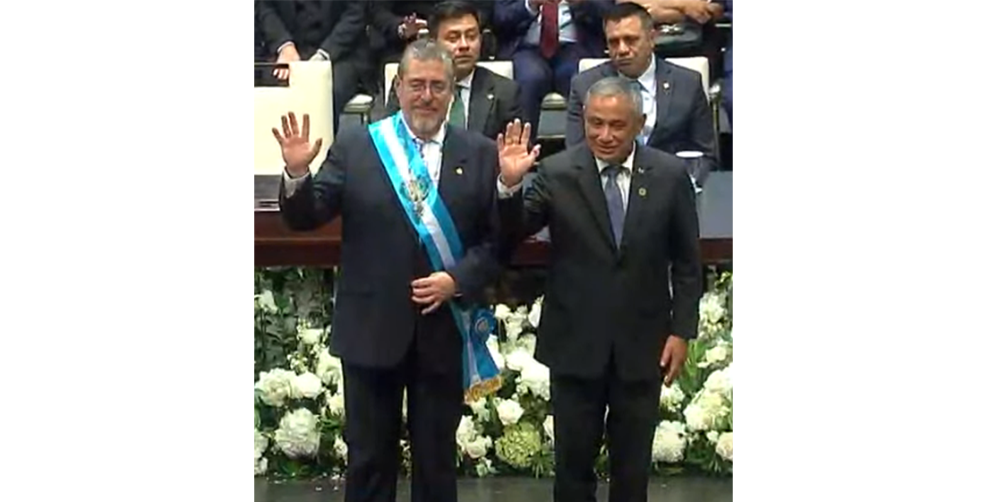Photo: Prime Minister John Briceño greets Guatemalan President Bernardo Arévalo after his swearing in
GUATEMALA CITY, Wed. Jan. 17, 2024
Belize’s Prime Minister, Hon. John Briceño was among the less than a dozen country leaders who hung around for the swearing in of reformist President Elect of Guatemala, Bernardo Arévalo de León who was scheduled to be sworn in on Sunday, January 14 – the day mandated in the Constitution for the accession of power. After 9 hours of delay, some leaders, like the King of Spain, Felipe VI, simply could not stay any longer to catch the swearing-in set to happen at the National Theatre beginning at 3:00 p.m.

Belize’s Foreign Minister, Francis Fonseca and Prime Minister John Briceño held bilateral talks with Guatemalan President Elect, Bernardo Arévalo before Arévalo’s swearing-in in Guatemala City
The day’s events were to get underway promptly at 8:00 a.m. on Sunday with the pomp and circumstance of the outgoing 9th Congress (Guatemala’s legislature) overseeing the election of the new Board of Directors which administers the work of the congress. That was to be followed by the swearing-in of the 10th Congress and then Arevalo’s installation. However, there was a first delay of an hour and a half due to ongoing negotiations among the political parties for Board of Director slates to be presented.
It would not be until 12:21 a.m. on the morning of Monday, January 15, that Arévalo would be administered the oath of office. PM Briceño was among the government leaders who was able to stay to witness the very late swearing-in. Hon. Francis Fonseca, who accompanied the Prime Minister along with his CEO, Amalia Mai, would later comment on his Facebook page, “As we pursue a final resolution of the unfounded claim at the ICJ, it is important for Belize and Guatemala to maintain cordial and respectful relations, particularly in the areas of trade and security. The experience in Guatemala reminds us why it is important to never take democracy and free, fair elections for granted.” He noted that there came a point on Sunday when word was that there would be no inauguration. Eventually, at around 6:30 p.m., they were told it would happen at 8:30 p.m. Fonseca also confirmed that during the trip, apart from holding bilateral meetings with representatives of Canada and Mexico, he and PM Briceño had an opportunity to speak with both Arévalo and his Foreign Minister elect.
It was expected that the accession to power would have been completed by 4:00 p.m. on Sunday. Instead, Arévalo’s opposition was accused of employing delay tactics in an attempt to weaken his authority. The 9-hour delay even led political pundits to question whether there would be legal trouble for Arévalo if the swearing-in was not completed before midnight. At the end of the day, today, Wednesday, January 17, Guatemala’s highest court, the Constitutional Court ruled that the swearing-in of Arévalo and his vice president, Karin Herrera, stands. However, after five actions for injunctive relief were sought, the Court ordered that the vote for the new Board of Directors for Congress be redone.
Since August 20, 2023, when he resoundingly won the second round of presidential elections against Sandra Torres, the “establishment” candidate of the Unidad Nacional de la Esperanza (UNE) party, Arévalo and his Semilla (Seed) Movement faced continuous attempts to prevent him from taking office. Though these threatened to drive Guatemala to the brink of a governance crisis, with thousands of demonstrators spilling onto the streets in support of Arévalo, the old guard did not desist until the end and after. The outgoing parliamentarians were accused of employing last-minute delay tactics on Sunday, leading to angry protests from the thousands who had gathered to witness the day’s events at the Constitution Plaza. Since the Constitutional Court had ruled that Semilla would be temporarily suspended, a Credentials Commission of the 9th Congress decided on Sunday that Semilla candidates could only be sworn in as independents, and, as such, they would not be able to form part of any slate for the Board of Directors. This and other decisions adverse to Semilla were adopted by the outgoing Congress. The process would eventually erupt into chaos, riling up demonstrators who barged through a police line in the periphery of the Congress. Semilla subsequently managed to have the decisions of the 9th Congress overturned, and presented a multi-party slate for the Board of Directors. Heading the slate was Semilla’s 31-year-old Samuel Pérez. Sandra Jovel, former Foreign Minister under former president Jimmy Morales, accused the U.S. delegation attending the ceremony of meeting with deputies supposedly to exert pressure on them not to vote for her. In the end, her slate received 75 votes while Pérez’s obtained 92 votes. After the 10th Congress of 160 deputies had been sworn in, Jovel told the media that the entire process had been fraught with illegalities, and that they would consider legal recourse for violations of the Constitution. She insisted that the country ought to make its own decisions free from outside interference.
After his swearing in after midnight Sunday, Arévalo and Herrera moved over to the Constitution Plaza to greet supporters. Arévalo, deemed an anticorruption crusader, in his swearing-in speech pledged not to forget the indigenous population of Guatemala whose support he enjoys. They comprise over 40% of the country’s 18 million people. He has also promised sweeping reforms to tackle corruption. It is expected that he will continue to face an uphill battle. The contract for the Attorney General, Consuelo Porras, who was instrumental in the challenges against Arévalo, doesn’t end until 2026. However, Arévalo had indicated that he would meet with her to seek her resignation.
Notably, also today, Wednesday, the United States Department of State designated former president Alejandro Giammattei Falla “as generally ineligible” for entry into the United States due to his/ involvement in significant corruption. The State Department claims to have credible information indicating/ that Giammattei/ accepted bribes in exchange for the performance of his/ public functions during his/ tenure/ as president of/ Guatemala,/ actions it says undermined the rule of law and government transparency.

